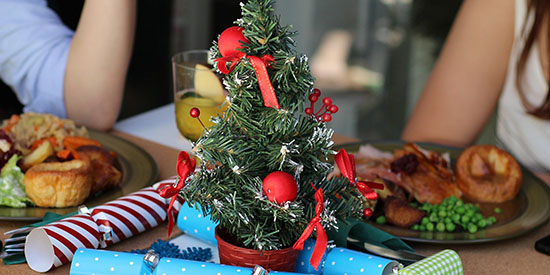What does a dietitian eat on Christmas Day?
Media releaseChristmas is typically a time for indulgence but Deakin University dietitian Dr Paige van der Pligt recommends healthy eating habits throughout the festive season.
"For many of us what we eat on Christmas day isn't what we would usually consume and that’s perfectly ok," Dr van der Pligt said.
"However it is not uncommon for festive season celebrations to begin in November and continue well in to the New Year.
"So if health is on the agenda, being mindful about what we put into our bodies with a balanced approach, throughout the whole festive season, is important."
Dr van der Pligt, a lecturer at Deakin's School of Exercise and Nutrition Sciences, said balancing fresh, healthy food with being physically active was a good start.
"Whatever the celebration, try to limit processed foods, often high in fat, sugar and salt," she said.
"Taking time during holidays to prepare food and make the most of fresh ingredients is often a much healthier option than relying on convenience foods and take away.
"Being mindful about going back for seconds is important too. We don’t need to eat until we feel uncomfortable and eating the foods we enjoy doesn't necessarily mean we need to eat copious amounts."
Dr van der Pligt's own healthy tips and substitutes for the Christmas season include:
- Serving unsalted nuts, low fat cheeses and dips instead of salted peanuts, high fat cheeses, chips and creamy dips;
- Baking vegies with olive oil and herbs rather than vegies cooked in butter and salt;
- Using lean meat cuts like turkey or kangaroo instead of processed meat like sausages which are usually high in fat;
- Limiting processed meats like ham which can be high in salt or salami which is high in fat and salt;
- Making fresh salads with plenty of cooked or raw salad vegetables. Lemon juice or olive oil are healthy alternatives to high fat mayonnaise or creamy dressings;
- Cooking fish on the barbecue like salmon which is high in protein and omega 3;
- Grilling prawns on the barbecue with lemon and chilli rather than creamy, high fat seafood sauce;
- Going easy on the pork crackling, it might taste great but it’s essentially just fat;
- Making desserts with plenty of fresh fruit;
- Serving smaller portions; and
- Mixing spirits with mineral water or diet drinks instead of sugary soft drinks
But just because Dr van der Pligt is a dietitian, doesn’t mean she doesn’t enjoy a Christmas treat or two.
"I would have to say my sister in law's homemade rocky road is my favourite festive treat. She makes it every Christmas day and it gets better each year," she said.
"I also enjoy a summer cocktail every so often during the festive season and a mojito would be one of my favourites on Christmas day. We make it with extra mint from the garden which is a nice, fresh addition.
"Rather than focusing on food avoidance, moderation is the best approach.
"There are definitely some more healthy choices and some less healthy options when it comes to the typical Christmas day menu, but it's more important to be mindful of a healthy, balanced diet throughout the festive period, rather than avoiding specific foods on one day of the year."

